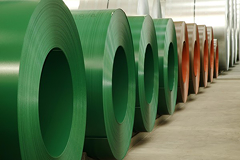EU berates China over steel subsidies
18/01/2013 12:00

The European Commission has concluded that China is providing illegal subsidies to its steel manufacturers, paving the way for European companies to seek higher import tariffs on a wide range of Chinese products.
The EU executive arm said Beijing was helping makers of organic coated steel – used in construction and to make household appliances – to obtain raw materials at below market prices, according to a report obtained by the Financial Times.
The report comes amid high tensions between China and the EU across a range of industries from solar panels to telecommunications equipment. It recommends hitting imports of Chinese coated steel with countervailing duties of up to 50 per cent. Last year, the commission imposed provisional anti-dumping duties of up to 58 per cent on Chinese steel producers over a related complaint.
The move should provide relief to European steelmakers such as ArcelorMittal and ThyssenKrupp which have seen demand sag because of the economic crisis and have also lost market share to Chinese rivals.
The findings could have wider repercussions for a host of European industries if they establish that China provides rolled steel – a key ingredient in making coated steel – to manufacturers at heavily subsidised prices.
One trade lawyer said that the report – if formally adopted – would allow European companies in the eyes of the EU to “challenge anything metals-based coming out of China”, from cars to white goods.
The commission will present the report to its EU member states this month, and must then determine whether to request formal duties.
The report said China provided the subsidies mainly through export restrictions that artificially lower prices of rolled steel for domestic manufacturers. The EU and US have already challenged this practice at the World Trade Organisation for a host of other raw materials.
The commission also concluded that Chinese coated steel producers benefit from subsidised land, water, electricity and loans.
A spokesperson for Karel De Gucht, the EU trade commissioner, declined to comment. Under Mr De Gucht, the commission has worked doggedly to prove a systematic campaign by Beijing of lavishing improper subsidies on favoured industries to boost their competitiveness in global markets – an effort that has soured trade relations.
Beijing has repeatedly denied that its subsidies are illegal, and has pointed instead to a range of support schemes employed by Brussels and European governments to support European companies.
In 2011, the EU imposed duties on Chinese coated fine paper, marking the first time that it had penalised the country for illegal subsidies. It has since embarked on a probe of imported Chinese solar panels.
Mr De Gucht is also considering launching an anti-subsidy investigation into China’s telecommunications equipment manufacturers, including Huawei Technologies, which some analysts warn could provoke a full-blown trade war.
The telecoms case is particularly controversial because it would mark the first time the commission has launched such an investigation on its own initiative, and not at the behest of a company or industry. The steel investigation was launched following a complaint by Eurofer, the European steel industry’s trade group.
January 14, 2013 8:53 pm
By Joshua Chaffin in Brussels
Source: ft.com
Các tin khác
- Vietnam and Southeast Asian Solar Firms Face US Anti-Dumping, Anti-Subsidy Probe (03/05/2024)
- Infrastructure development creates momentum for exports to "neighboring" markets (03/05/2024)
- Seaports increase services to attract goods (03/05/2024)
- Chinese EV makers risk tougher duties over failure to cooperate with EU probe (03/05/2024)
- RoK burgeoning market for Vietnam’s agro-forestry-fisheries exports (03/05/2024)
 Home
Home
 About Us
About Us




















